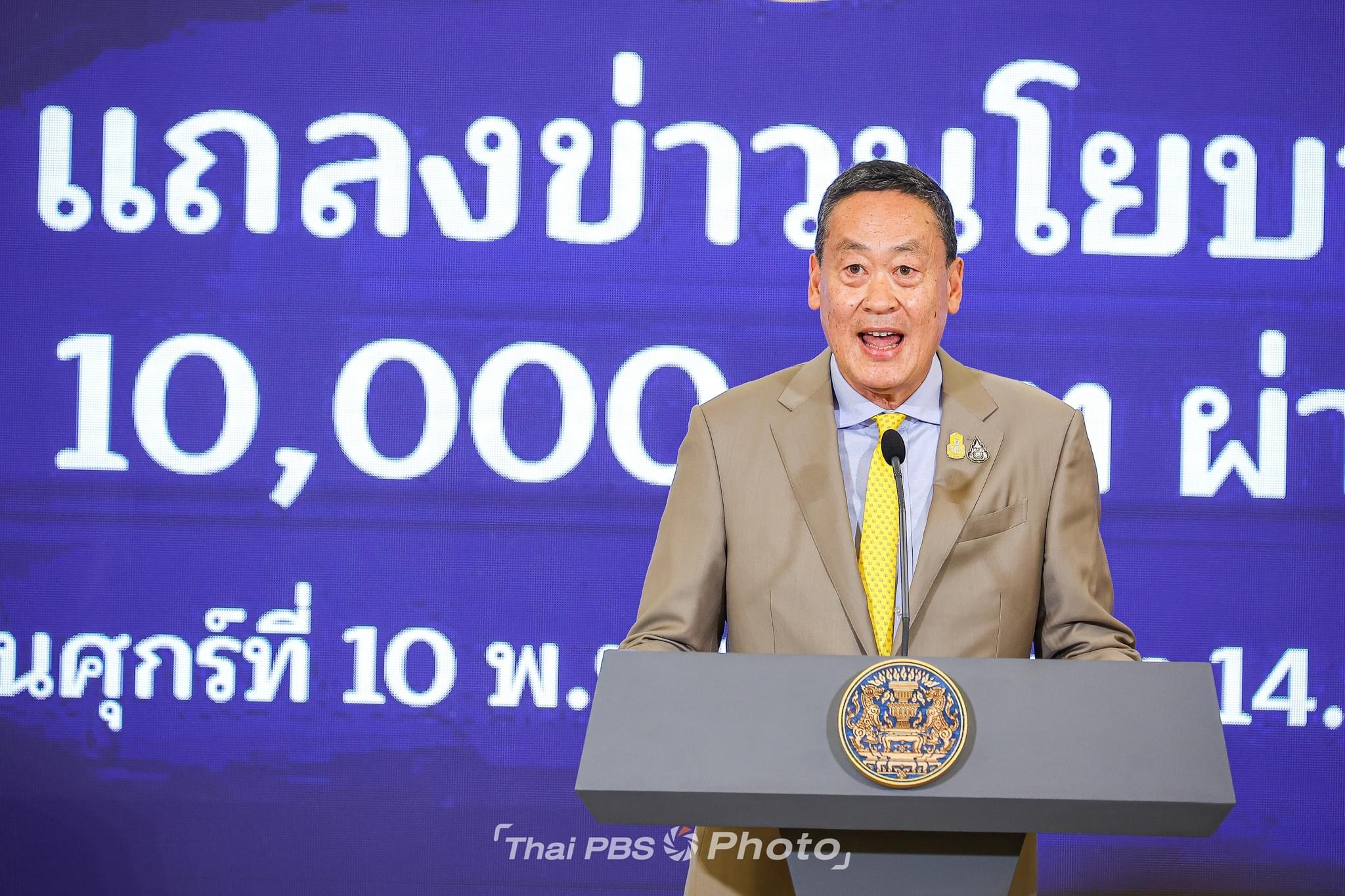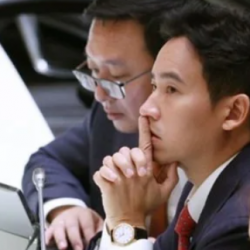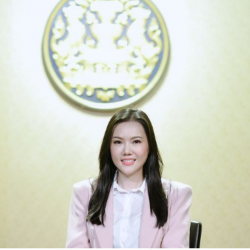Does the digital wallet scheme risk running into a legal hurdle?

Prime Minister Srettha Thavisin has finally brought some clarity to the source of funding for the controversial digital wallet handout scheme, but many aspects of the scheme remain problematic, raising questions on whether it would see the light of day.
Srettha, who is also the finance minister, announced on November 10 that the Pheu Thai-led coalition government planned to borrow 500 billion baht to finance the digital wallet scheme promised by his party during the election campaign.
The government would propose a bill to Parliament for approval, an extra borrowing bill apart from the routine borrowing to finance expenditures under the annual budget expenditure for fiscal year 2024.
Srettha said all Thai citizens aged 16 years and above would be eligible to receive a one-time handout of 10,000 baht from the government in May next year. However, those who have a monthly income of 70,000 baht and above, or have a bank balance of 500,000 baht and above will not be eligible for the handouts.
Srettha estimated that 50 million people would be eligible. The recipients will have to spend the digital handout within six months, buying goods from registered businesses in their district. The handout cannot be used for buying certain products and services, such as alcoholic beverages and debt payment. Srettha reiterated that the main objective of the handout was to stimulate the economy.
Many changes
Since being announced to the electorate, the scheme has undergone some amendments. The number of recipients has been trimmed to 50 million from 54 million earlier, the estimated cost has been revised downward from 560 billion baht to 500 billion baht. The government has also introduced an income criteria to determine eligibility.
Earlier, Pheu Thai leaders had said that the scheme could be implemented through a small borrowing and the rest of the amount would be raised by cutting other redundant government projects and through additional tax revenue.
The controversial scheme has been met with fierce opposition from academics who are worried about the impact on fiscal discipline, rising public debt, while yielding only limited gains in terms of economic growth.
“The government has taken into account some of the concerns we had raised,” said Sakon Varanyuwatana, professor and a former dean at Thammasat University’s Faculty of Economics. He was one of 99 academics who had issued a joint statement opposing the scheme by citing their many concerns.
A step in right direction
“The good thing is that the government has integrated the scheme into the country’s fiscal system,” he said. Previously there was no clarity on where the funding would come from and some had suggested that the government might resort to a quasi-fiscal measure by borrowing money from state-owned banks, a tactic to avoid close scrutiny by Parliament and hiding actual public debt.
The new borrowing is unlikely to add too much to the public debt level in the next few years, if the economy expands as expected by the government, said Sakon.
Currently public debt is about 62 per cent of gross domestic product (GDP), but it may increase a few more few percentage points due to the borrowing for this scheme.
“However, I am worried about fiscal discipline and annual debt repayment at the expense of other productive spending,” Sakon said.
The government would have to set aside money every year to repay the debt while the interest rate is now higher than in previous years. And when there is more government borrowing, it would be competing for funding with the private sector which would drive interest rates up and hurt businesses, he warned.
Since August last year, the Bank of Thailand (BOT) has increased the policy rate eight times in a row to 2.5 per cent, the highest in 10 years. While Thailand has seen capital outflows from the stock market and corporate bond market, there have been alarming news reports of some listed companies facing the risk of defaulting on their corporate bonds commitments. The capital and debt markets are not on the corporate side currently, according to market analysts.
Issues needing urgent attention
Another key point is opportunity cost. “We could put this money to better use by spending it on more productive investments to address structural issues such as the quality of education and laying the framework for social welfare, which is under high pressure from an ageing society,” Sakon lamented.
Thai governments have run fiscal deficits for years, caving in to pressure from welfare spending and infrastructure investment. Tax revenue is seeing a declining trend in the post-COVID-19 phase.
Before the pandemic, the government’s tax revenue accounted for about 17 to 18 per cent of GDP, which is relatively small compared with other countries at the same stage of economic development. In the post-COVID-19 phase, tax revenue is only about 13-14 per cent of GDP, said Sakon.
The challenge before the government is to reform the tax structure. There are many options, such as raising the value-added tax rate, increasing the wealth tax rate and introducing an environmental tax, he suggested.
A political game?
The government’s borrowing plan risks failure due to certain legal hurdles it may encounter.
“The digital wallet borrowing plan risks violating Section 140 of the Constitution and Section 53 of the State Fiscal and Financial Disciplines Act 2018, which stipulate urgent necessity as a key condition for the government to borrow beyond what it does normally to finance its annual budget,” said Sirikanya Tansakul, deputy leader of the opposition Move Forward Party. She did not agree with Srettha, who insisted that the borrowing would be in line with the laws.
Those laws say that extra loans can be borrowed in situations of need for urgent action to resolve critical problems of the country, where annual appropriations are not adequate. Critics argue that Thailand currently does not face that kind of situation.
“Today there is no critical problem that needs to be addressed urgently,” said Sirikanya.
“It is the government’s way to wriggle out of the scheme,” she speculated.
She cited the previous instance of a 2-trillion baht borrowing bill proposed by the Pheu Thai government in 2013 to finance the high-speed railway, which was blocked by the Constitutional Court, as it was “not an urgent need”.
The new bill to borrow 500 billion baht “is a publicity stunt to mislead people into believing that they would get the cash when the government realizes that it would not happen. If a petition is submitted to the Constitutional Court and the court rules against it, then the government can claim it was helpless because of the court’s action,” she added.
Short-term vs long-term
Srettha and other Pheu Thai leaders have claimed that the cash handout would generate demand and facilitate higher growth, helping push the economy to expand by 5 per cent on average during their next four years in office.
They argue that amid the slower economic growth and uncertain global economy, it was justified to pump cash into the economy. Economists, however, are challenging this narrative, arguing that the economy was on the road to recovery and there was no need for major short-term spending to boost consumption. The BOT has forecast economic growth at 2.8 per cent this year, driven mainly by recovery of tourism in the post-COVID-19 rebound. It has forecast higher growth next year at 4.4 per cent. The growth rate was 2.6 per cent last year.
Most of the economists point to the need for attention on structural issues, such as an ageing society, a shortage of skilled labour, low public investment, low labour productivity and the country’s declining competitiveness. They want the government to focus on the long term rather than boosting short-term consumption via the digital wallet scheme.
By Thai PBS World’s Business Desk






